Having enlarged or swollen taste buds on tip, sides, under or back of tongue! In this article, we provide you with some of the possible causes of swollen or enlarged taste buds. The article also provide a list of possible home remedies and medical treatment option on how you can get rid of inflammation on your taste buds.
Taste buds are bulbous nerve endings on found on the tongue. They appear on the tip, right, left or at the back of the tongue. These endings are responsible for the sense of taste. The bumps may also appear on the mucous membrane lining the mouth.
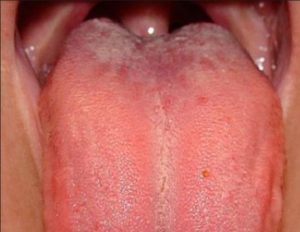
What Causes Swollen or enlarged Taste Buds on your Tongue?
Swollen or enlarged taste buds are common after eating salty, acidic or spicy foods. The swelling will in most cases be accompanied by redness and a painful felling of itching. Most people relieve this symptoms by scraping their tongue against the teeth.
Below are some other possible causes of these inflammations and swelling.
- Allergic tongue reaction
- Burns from hot foods and beverages
- Oral Cancer
- Dry mouth and throat
- Acidic reflux
- Vitamin deficiency
- Tongue rubbing and injuries
- Lupus
- Sore throat and cold sores
- Hormonal imbalance-stress anxiety and depression
- Swollen buds from sugar and sweats
- Oral thrush and infection
- Herpes
- Yeast infection on mouth
Swollen Taste buds Video
Swollen taste buds STD
Sexually transmitted infection can also cause the swelling of taste buds. Herpes simplex virus an STI is known to cause fluid filled bister that appear on the edges of the lips. The painful blisters can also appear on the surface of lip causing this kind of swelling. These blisters often appear in patches. After a breakout of the blisters, a crust forms over the resulting sore. Cold sores will usually heal within a week or two.
Oral herpes is another sexually transmitted infection that can cause the swelling and inflammation of the taste buds in mouth. It is an infection of the lips, mouth, gums and tongue. The condition is known to cause pain, burning, tingling or itching occurring on the infecting site. Oral herpes can also cause oral sores.
Swollen Taste Buds on Tongue Pictures
Below and throughout this article we have provided some images for visual assistance of how swollen taste buds look like. The appearance will however vary from person to person depending on the underlying cause of the swelling. The images provided are only for illustration purposes and cannot be substituted for a professional medical diagnosis.
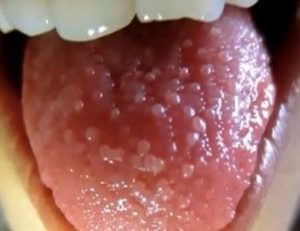
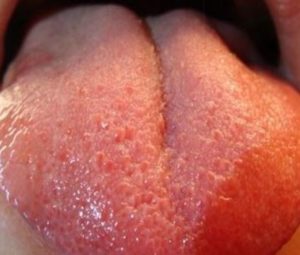
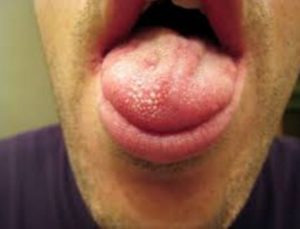
Swollen Taste Buds on Back of Tongue
An average person has around 10.000 taste bud that are replaced every 2 weeks. As said, these are small sensory organs appearing on the tongue that help you experience taste (salty, sour, and bitter). The tongue map is such that, the taste buds for sweat are at the tip of tongue, those for sour are on either sides whereas those that taste bitter are way back.
As a person ages, some of these taste buds do not get replaced. They drop in number. That explains why certain foods may taste stronger to your people than in adults. Taking excessive alcohol and tobacco product may also damage this microscopic hair. Tobacco paralyzes nasal cilia, responsible for moving mucous in the nose. It can also lead to sinus infection. Tobacco coats your tongue with tar, dulling your ability to taste.
Hot foods and drinks might also urn this buds causing inflammation and swelling. You can notice this immediately if you tried taking a hot drink like coffee. With time the inflammation will clear and the taste buds will start working correctly again. To relive the symptoms faster, you can try parting your tongue with ice or aloe Vera gel.
Oral disease and infection are can also cause the swelling of these buds at the back of tongue and a different site the infection appears on tongue. These infection will include candidiasis, oral thrush, canker sores, oral cancer or mouth ulcers. These infection can be responsible for multiple swollen buds on tongue.
The possibility of having these enlargements also increases due to Vitamin deficiency. Lack of vital vitamins and nutrients in the body like lack of sufficient iron is known to cause the swelling of tongue. Chronic insufficiencies will even cause the tongue to turn red and inflamed. The tongue will even become panful a typical symptoms of Plummer Vinson syndrome.
Swollen Taste Buds and Sore Throat
Sore throat is a condition marked by pain in the throat. This is caused by inflammation due to cold or other virus. Sore throats are very common and in most cases nothing to worry about. They normally get better and clear on their own within a week. The condition is typical symptom of cold or flu, laryngitis, tonsillitis or strep throat. These condition might also lead to the swelling of the taste buds when unchecked.
With poor oral hygiene, you might also develop oral thrush or yeast infection on tongue or mouth. He condition is not contagious and can successfully be treated with antifungals. Oral thrush is known to cause white patches ion tongue, loss of taste, redness inside mouth, cracks at the corner of mouth and painful, burning sensation in the mouth.
Swelling of the taste buds caused by sore throat, oral thrush or fungal infection can be relieved at home. However, when the symptoms become severe, you need to have a dentist examine the symptoms and prescribe the right medication. Avoid, smoking, harsh toothpastes and hot drinks until the conditions clears completely.
Swollen taste buds all over the tongue
Are you able to differentiate between different tastes? If your answer is yes then your taste buds are working properly. However, if you are unable to do so completely, it means you have swollen taste buds all over your tongue. That is, the taste buds at the tip, sides, and back of your tongue are not functioning correctly.
Having all the taste buds swollen can be disgusting. How then did you end up here! According to dentist, a normal person has more than ten thousand taste buds distributed evenly on the tongue. These are microscopic hair like-structures that help us feel the taste of different foods and drinks we consume. These structures can get inflamed, swelling and cause you to loss that precious sense of taste.
The swelling can be caused by trauma or injuries appearing on the tongue or mouth, for example you might bit you tongue or burn the buds by taking hot drinks. Tobacco smoking is also know to cover these buds with tar, these may also cause the loss of taste.
Other possible causes of these swelling might include poor hygiene which might lead to fungal infection on tongue and the mouth. Oral infection like cold sore and vitamin deficiency are also possible causes of these swellings. Seek medical advice if the swelling fails to clear within a week or other symptoms like pain, burning sensation and redness start to appear.
Swollen taste buds on side of tongue
The taste buds on side of tongue are responsible for salty ad sour taste. Those at the tip of tongue will handle sweat whereas those at the back are responsible for bitter taste. As sad earlier, there are thousands of these microscopic hair-like structures that facilitates taste.
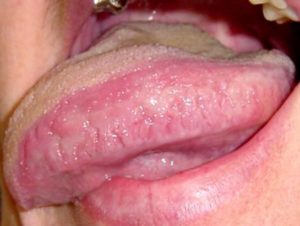
Trauma and injuries like biting your tongue with your teeth is likely to cause the swelling of the buds on either sides of your tongue. This can be said to be normal because, the tongue will repair and you can continue enjoying the lovely taste of salt and sour. For a heathy person, these buds will replace naturally after every two weeks. So if you are unable to feel taste after two weeks of injury, please consult your doctor.
Oral cancer and most specifically tongue cancer can also cause these kind of swelling. Tongue cancer is a type of oral cancer that forms in the front two-thirds of the tongue. That occurring on the back one third is considered a type of head or neck cancer this is according to the Cancer Treatment Center of America.
Tongue cancer develops on the squamous cell, the thin flat cells that cover the surface of the tongue. This is a chronic condition you will need to have a dentist or a general practitioner diagnose these condition for early medication ad treatment to prevent the spread to other parts of the mouth.
Harsh mouth wash may destroy the mucous lining your mouth, that is the tongue, the gums and a times the throat. What happens is, after your mucous lining is stripped away, remaining bacteria can move more easily penetrating your exposed tissues. The bugs that survive the mouth wash are now able to invade since defense s are now stripped away. This cause the damaging of the taste buds which cause them to inflame and become swollen.
Swollen taste buds under tongue
Taste buds contains taste receptor cells also known as gustatory cells. These taste receptors are located around small structures known as papillae fund on the upper surface of the tongue. It is the structure in the upper surface and not those under tongue that are involved in detecting the five elements of taste perceptions: salty, sour, bitter, sweet and umami.
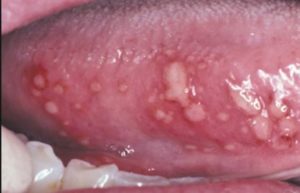
Though the combination of the elements above, we are able to detect flavors. The swelling of taste is common to most people. The swelling should clear when the buds replaces within two weeks or so. These swelling can be caused by a number of condition ranging from oral infections, injuries, taking hot foods and drinks and many others.
Avoiding some cause like smoking and taking too hot drinks might help prevent the swelling. For bacterial or viral infections cause these swelling, antibiotics and antivirals can be used respectively. Seek immediate medical attention if you start experiencing sign and symptoms such as burning sensation, sever itching and swelling of the tongue.
Swollen taste buds on tip of tongue
It is believed that, the taste buds at the tip of tongue are responsible for the taste of sweat. Some researchers contrast with this, saying any taste can be detected by any area of the tongue. Food dissolve in saliva and comes into contact with taste receptors via small openings in tongue epithelium called taste pores.
The taste pores are located on top of taste receptors cells that constitute the taste buds. The taste receptors will send information detected by clusters or various receptors and ion channel to the gustatory area of the brain via cranial nerve (seventh, ninth and tenth cranial nerve).
The taste buds appearing on the tip of tongue might swell for a number of reasons. Trauma and tongue injury is a common cause of these swelling. Fungal infection on mouth leading to oral thrush might also result in these kind of swelling. For some people, drug and food allergy might cause the rupturing of the mucous membrane lining the mouth leading to the swelling of the buds.
Vitamin deficiency especially for children and those with malnutrition might also be the cause of these swelling. Most of these case are mild and are expected to clear eve without medical intervention. If however, this is not the case, and you start developing other symptom like swelling of the entire tongue, then this would be a clear indication of an underlying medical condition.
Have a dentist or a general practitioner diagnose the condition and offer the right treatment. Symptoms to watch out for include numbness in mouth, boils on tongue and gums, painful blisters appearing on mouth and complete loss of taste.
Swollen taste buds white – causes for white enlarged taste buds
White enlarged taste buds will appear on the tip of tongue and before you know it spread through to other parts of the tongue. White swollen taste buds or enlarged papillae are harmless. They can occur as a symptom of serious underlying medical condition.
Transient lingual papillitis or lie bumps is one of the most common cause of swollen white buds on tongue. It is a local inflammatory disorder that affects the fungiform papillae present on the tongue dorsal are. The condition is characterized by enlarged papillae and tiny red or white tiny bumps. Most patients experience tingling and burning sensation on tongue. Pain an itching may also be felt.
Apart from this, other causes of these inflammation will include canker sores or mouth ulcers, excessive smoking, injury or irritation of the tongue and gastrointestinal disorder. Check with your dentist the actual underlying cause of your swelling for effective treatment.
Treatment for inflamed, enlarged or swollen taste buds on tongue
The treatment for inflamed or enlarged taste bud will depend on the underlying cause. For cases of excessive smoking, alcohol or harsh toothpaste, discontinue the use of these irritants to prevent further damaging and offer an enabling environment for healing.
In cases of bacterial, or fungal infection as is the case with oral thrush, your doctor might prescribe oral antibiotics. If the underlying cause of the swelling is viral infection for example oral herpes, then antiviral medication will be used. Treating the underlying medical condition causing the swelling is the best way to treating the swelling.
Swollen taste buds remedy, cure, Home remedies
Since most of the swelling are mild and harmless and can clear on their own without medication, we have provided you with some natural home remedy the will help ease the symptoms and accelerate the healing of the swollen taste buds on tongue.
Apply organic honey
When used as an oral swish, organic honey will help relieve the swelling and inflammation of the taste buds. It is a natural antibiotic that can also be helpful in fighting infection causing the swelling thus accelerating the healing process.
Salty water gargle
A salty water gargle twice or thrice a day will help ease sore throat and mouth ulcers. It can also help keep bacterial away and keep your mouth fresh from bad breath when you are unable to clean your mouth using a toothbrush.
Baking soda with Hydrogen peroxide
If salty water gargle is not working for you, mix a tea soon of baking soda then add some amount of hydrogen peroxide, mix to make a paste. Gently brush your mouth with this paste to kill bacteria, relieve the itching and inflammation and to keep your mouth clean and your breath fresh.
Maintaining oral hygiene
Make sure you brush your mouth after meals to prevent bacteria buildup and accumulation leading to these kind of inflammation and oral infections.
Tea tree oil rinse
Tea tree oil is a natural antibacterial disinfectant commonly used as a general antiseptic. It can be an effective remedy for fungal, bacterial or viral infection when used as a mouthwash. For swollen taste buds caused by sore throat, tea tree oil can be a rarely good remedy.
Sources and references
- Swollen taste buds: http://medlicker.com/1124-swollen-taste-buds
- Dealing with inflamed taste buds: http://www.newhealthadvisor.com/Swollen-Taste-Bud-on-Tip-of-Tongue.html
- Inflamed taste buds: http://www.getbestadvice.com/health/tongue/enlarged-taste-buds-causes-tip-back-side-tongue-treatments-remedies/
- Home remedies for inflamed taste buds: http://emedicalhub.com/inflamed-taste-buds/
- Swollen taste buds causes: http://www.healcure.org/tongue/taste-buds/swollen-taste-buds-causes-get-rid-back-of-tongue-tip-pictures-sore-throat/
